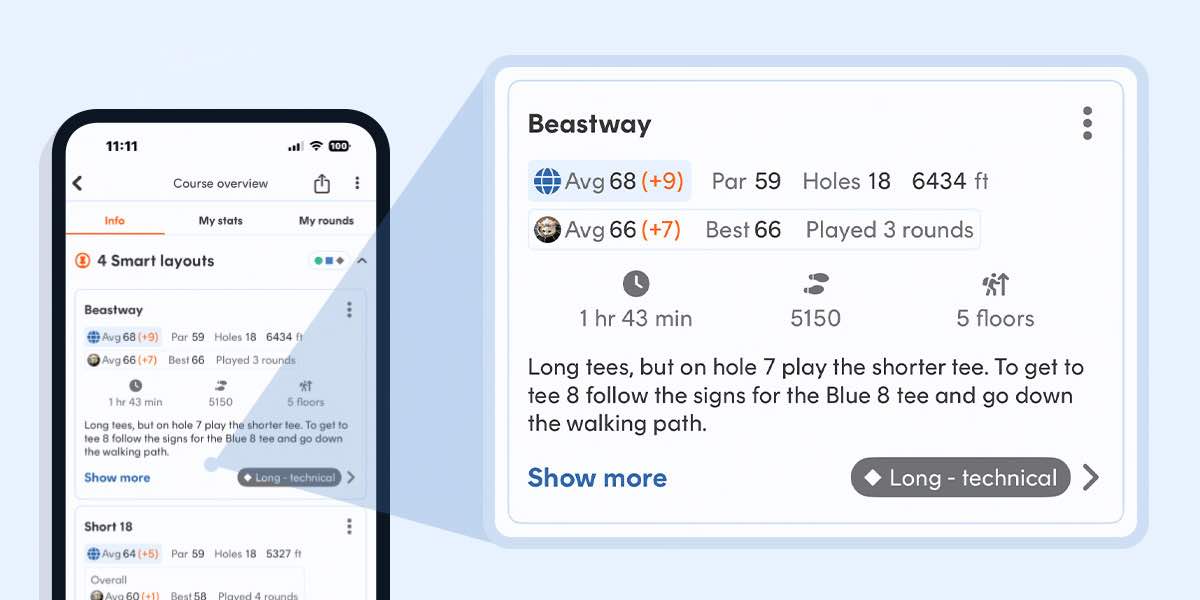For most people, walking is the most basic way to get from one place to another. We walk through our homes, our workplaces, grocery stores, parks, and the list goes on. It's so commonplace that many of us don't even think of it as exercise.
However, studies have demonstrated that walking has significant physical and mental health benefits. Some have concluded that even the amount of walking involved on a short nine-hole disc golf course is enough to significantly decrease your mortality risk.
How Much Do You Really Walk While Playing Disc Golf?
On short, nine-hole disc golf courses, players walk about a mile/1.6 kilometers on average. They tend to cover just under three miles/4.8 kilometers on very long, 18-hole courses.
Those distances are based on step counts from the millions of disc golf rounds tracked with the UDisc app on over 14,000 disc golf courses across the world. The designations "short" and "very long" come from our recently-introduced disc golf course difficulty rating system, which includes course distance classifications based on average hole length:
-
Very Short: Holes average less than 180 feet (55 meters)
-
Short: 180-247 feet (55-75 meters)
-
Mid-Length: 247-310 feet (75-95 meters)
-
Long: 310-394 feet (95-120 meters)
-
Very Long: Greater than 394 feet (120 meters)

You can find length rating and average step count – along with typical round duration and floors ascended – for most courses in the UDisc disc golf course directory by expanding the Layouts sections of their entries in the app or online. This information can be helpful when asking important questions like, 'Do I have time to squeeze a round before it gets dark?' or 'Will I get back to work all sweaty after playing this course?'
Here's what our stats say about average step counts at courses in different length categories:
| Hole Count | Course Length | Average Steps |
| 9 | Short | 1,906 |
| 9 | Mid-Length | 2,210 |
| 9 | Very Long | 3,064 |
| 18 | Short | 3,829 |
| 18 | Mid-Length | 4,360 |
| 18 | Very Long | 5,886 |
And here are average step counts on layouts at the most popular courses in a few disc golf-loving countries:
| Country | Course | Hole Count | Average Steps |
| Denmark | Valbyparken Disc Golf | 18 | 5,224 |
| United States | Morley Field | 19 | 4,228 |
| Norway | Ekeberg Frisbeegolfbane | 18 | 3,714 |
| Canada | Baker Park | 18 | 3,851 |
It's important to remember that these counts are just averages and that the number of steps taken will vary from person to person and round to round.
Physical Benefits of Walking & How Disc Golf Helps You Get Them
10,000 steps is often thrown around as a sort of magic number when it comes to discussing just how much walking someone should do to improve their health. However, we all know magic doesn't really exist, and reality is a little more nuanced. The good news is that walking far less than 10,000 steps a day can still improve your overall health and significantly reduce all-cause mortality.
A 2023 study in The European Journal of Preventive Cardiology found that participants increasing their step counts by 1,000 steps per day (over a baseline median step count of 3,867) led to a 15% decrease in all-cause mortality. A 500-step-a-day increase led to a 7% decrease in all-cause mortality. The study found that mortality rates continued to decrease as steps increased.
Based on those step count averages at disc golf courses we talked about earlier, playing your local short, nine-holer is almost sure to add over 1,000 steps to your day (and, likely, closer to double that). Based on the cardiology study's results, that quick round would help you live a longer, healthier life. Playing a long 18-hole course on the weekend is even better.
Other Benefits of Walking
As if staving off the Grim Reaper wasn't enough, walking can also keep our minds sharp, thinking positively, and being creative.
Walking in outdoor, non-urban settings (exactly where you'll find most disc golf courses) has been shown to reduce rates of depression and anxiety. A study done in Japan and published in the International Journal of Environmental Research and Public Health found that people – especially those with higher-than-average anxiety levels – who walked in forested and other natural areas had a significant reduction in the feeling of "depression-dejection."
Another paper in the same journal suggested that walking could be especially beneficial for seniors. It detailed research showing that "older adults who frequently engaged in leisure walking were less likely to develop Alzheimer's Disease and other dementias."
And next time you have a problem you're struggling to find a solution for, yet another study showed that getting in a walk on the disc golf course could help you come up with new ideas.
Compared to sitting, walking has been shown to greatly increase one's creativity. A 2014 study done at Stanford University and published by the Journal of Experimental Psychology: Learning, Memory, and Cognition discovered that "Walking opens up the free flow of ideas, and it is a simple and robust solution to the goals of increasing creativity and increasing physical activity."
While both walking on a treadmill indoors and walking outside got creative juices flowing, "walking outside produced the most novel and highest quality analogies," meaning disc golf could potentially be an extra potent way to generate creativity. Just be careful to not use it all up figuring out how to best navigate the next hole.
Disc Golf: Great Motivation for a Good Walk
There's a well-known quote that's most frequently, but probably incorrectly, attributed to Mark Twain that says, "Golf is a good walk spoiled." But we prefer to think of disc golf as great motivation for a good walk. By giving walkers concrete goals and tickling most people's natural desire to improve, disc golf gets people out and moving who may find the idea of walking for walking's sake unappealing.
And, as we discussed above, even a fairly modest amount of movement can do a lot to improve physical and mental health. Since most disc golf courses are free, it's not a hobby that will break the bank or require significant budget changes like a traditional golf club or gym membership.
With all these benefits in mind, maybe it'll be easier next time you're debating whether it's worth squeezing a round into your daily schedule. After all, now you have plenty of peer-reviewed excuses.

